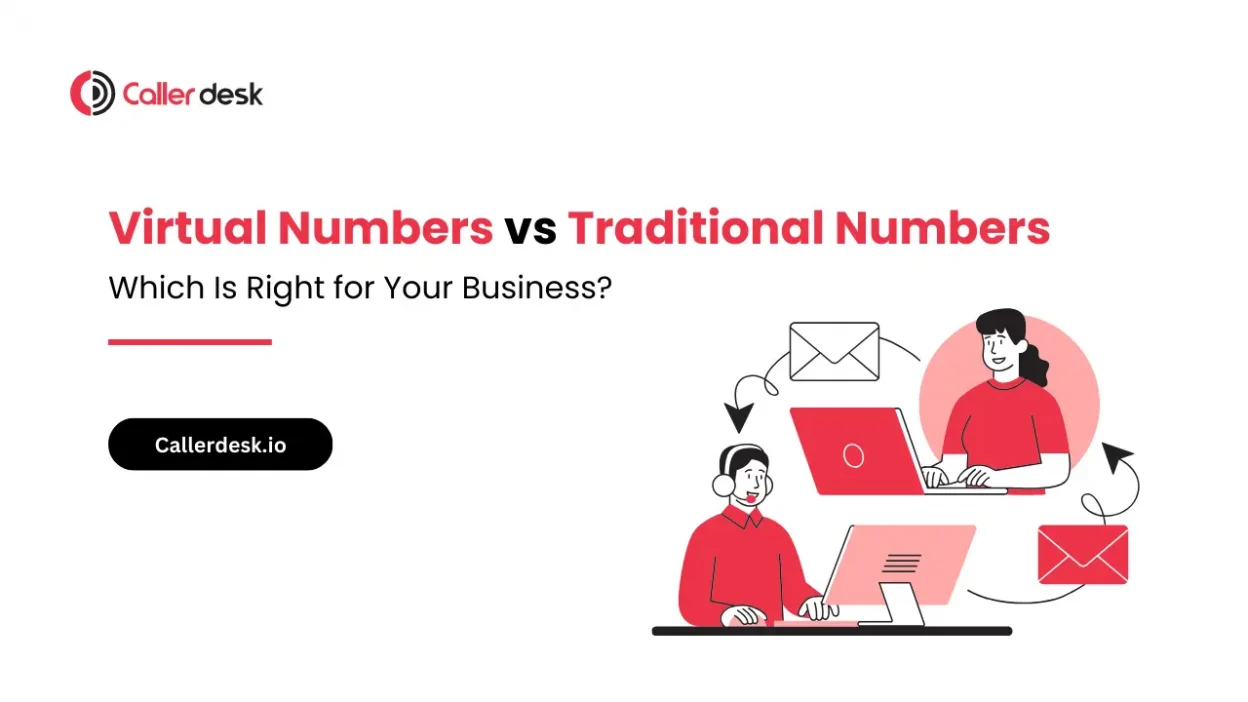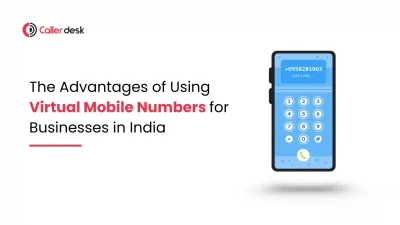Are you having trouble deciding between virtual numbers and traditional numbers for your business?
This critical decision can significantly impact your company’s communication strategy and overall efficiency. With the rapid advancement of technology, understanding the differences and business needs of each option is essential.
In this blog, we’ll explore the differences between virtual and traditional numbers, helping you determine which is the best fit for your business needs.
Understanding Virtual Numbers and Traditional Numbers
Virtual Numbers
A virtual number is a number that exists in the cloud rather than being tied to a particular physical phone line or device. Virtual numbers operate through the internet, using Voice over Internet Protocol (VoIP) technology to transmit voice data. This means that virtual numbers can be assigned to any device with internet connectivity, such as smartphones, tablets, laptops, and desktop computers.
Key Features of Virtual Numbers:
- Flexibility: Route calls to multiple devices.
- Scalability: Easily add or remove numbers as needed.
- Global Presence: Acquire numbers from different countries.
- Advanced Features: Voicemail, call forwarding, and SMS integration.
Traditional Numbers
Traditional numbers are conventional phone lines provided by telecommunications companies. These numbers are linked to physical phone lines and typically require hardware installation.
Key Features of Traditional Numbers:
- Reliability: Consistent and stable connections.
- Local Presence: Shows that a business has a local presence.
- Familiarity: Well-known and trusted by many customers.
- Security: Less prone to cyber-attacks.
Comparing Virtual Numbers and Traditional Numbers
1. Cost
- Virtual Numbers: Think about how much money you can save by using the internet for calls. Virtual numbers are often more cost-effective with lower setup and maintenance fees. Providers typically offer affordable packages tailored to business needs.
- Traditional Numbers: Remember the days of paying high bills for long-distance calls? Traditional numbers can be more expensive due to hardware costs and higher monthly fees. The cost of installing physical lines and ongoing maintenance can add up.
2. Flexibility and Scalability
- Virtual Numbers: Imagine your business suddenly grows, and you need more lines. Virtual numbers are extremely adaptable and scalable, allowing you to quickly add or remove lines based on business requirements. Perfect for growing businesses and those with fluctuating call volumes.
- Traditional Numbers: Have you ever waited for days to get a new phone line installed? Traditional numbers have limited flexibility. Physical installation is required when adding new lines, which can be time-consuming and costly.
3. Accessibility
- Virtual Numbers: Think about working from the beach, a café, or even your own home. Virtual numbers are accessible from anywhere with an internet connection, ideal for remote and global teams. They enable seamless communication regardless of geographic location.
- Traditional Numbers: Remember being tied to your office desk to take important calls? Traditional numbers are limited to the physical location of the phone line. Mobility is restricted, which can be a disadvantage for businesses with employees on the go.
4. Features and Functionality
- Virtual Numbers: Think about having a personal assistant for your calls. Virtual numbers offer advanced features such as call analytics, automated attendants, call recording, voicemail to email, and integration with CRM systems. These features can significantly enhance customer service and business efficiency.
- Traditional Numbers: Think of a basic phone that can only make and receive calls. Traditional numbers offer basic features with limited advanced functionalities. They may include caller ID, call waiting, and basic voicemail.
5. Reliability
- Virtual Numbers: Picture relying on your Wi-Fi for important calls. Virtual numbers are dependent on internet connectivity. There could be potential issues if the internet connection is unstable. However, with reliable internet, virtual numbers can be very dependable.
- Traditional Numbers: Think about the landline phones that rarely go down. Traditional numbers are highly reliable with stable connections, less affected by internet issues. They are often seen as more dependable, especially in areas with poor internet infrastructure.
6. Security
- Virtual Numbers: Consider the importance of online security. The security of virtual numbers is largely dependent on the provider. Reputable providers offer encryption and other security measures to protect calls and data.
- Traditional Numbers: Remember the old days when phone lines were less about cyber threats? Traditional numbers are generally more secure against cyber threats, but they are still susceptible to physical tampering and wiretapping.
Which Is Right for Your Business?
1. Business Size and Growth
- Small to Medium Businesses: Think about a startup growing rapidly. Virtual numbers are frequently more appropriate due to their lower costs, scalability, and ease of setup. They allow businesses to start small and grow without significant additional expenses.
- Large Enterprises: Consider a large corporation with established communication needs. Traditional numbers may be preferred for their reliability and established infrastructure. They provide a stable communication system necessary for large-scale operations.
2. Nature of Business
- Remote and International Teams: Imagine managing a team spread across different countries. Virtual numbers provide the flexibility and global reach necessary for distributed teams. They enable team members to communicate regardless of their location.
- Local Businesses: Think about a neighborhood store relying on local customers. Traditional numbers can enhance local presence and trust among local customers. They are particularly beneficial for businesses that rely on a local customer base.
3. Budget Considerations
- Limited Budget: Consider a small business watching every penny. Virtual numbers are a more affordable option, with lower setup costs and ongoing fees. Ideal for startups and small businesses.
- Larger Budget: Think of a well-established company with a steady income. If your business has a larger budget, traditional numbers can be a good option because they are very reliable and have a strong, established system.
4. Technology Infrastructure
- Tech-Savvy Businesses: Picture a company that thrives on the latest tech. Companies comfortable with technology and looking for advanced features will benefit from virtual numbers. They provide a variety of functionalities that can help streamline operations.
- Traditional Approach: Consider a business that prefers familiar methods. Businesses that prefer a conventional approach may lean towards traditional numbers for their familiarity and simplicity.
5. Customer Base
- Diverse Customer Base: Imagine serving customers from around the world. Businesses with a diverse customer base, including international clients, will find virtual numbers advantageous. They can provide local numbers for various regions, enhancing customer experience.
- Local Customer Base: Think about serving your local community. Businesses serving a local market may benefit from traditional numbers, which can foster a sense of community trust and reliability.
6. Disaster Recovery
- Virtual Numbers: Picture a storm damaging your office. Virtual numbers are excellent for disaster recovery plans. In case of physical office damage, calls can be redirected easily to other locations or devices.
- Traditional Numbers: Think about the hassle of a downed phone line. Traditional numbers are more vulnerable to physical disruptions. A damaged phone line can lead to significant downtime.
Conclusion
Both virtual and traditional numbers have their unique advantages. The right choice for your business depends on your specific needs, budget, and the nature of your operations.
Virtual numbers offer flexibility, advanced features, and cost savings, making them ideal for growing and remote businesses. Traditional numbers provide reliability, security, and a local presence, which can be crucial for large enterprises and local businesses.
By carefully evaluating your business requirements, you can make an informed decision that enhances your communication strategy and supports your overall business goals.
Ready to Upgrade Your Business Communication?
Explore CallerDesk, the leading provider of virtual mobile numbers, and discover how we can help your business thrive. With advanced features, excellent customer support, and affordable packages, CallerDesk is your perfect partner for modern business communication.





